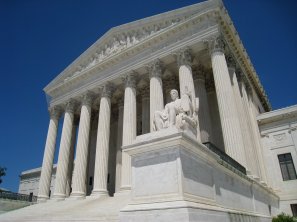The title may seem paradoxical, at first. But it gets at one of the most important and misunderstood aspects of federalism. Contrary to “states rights” advocates, federalism does not mean that the federal government is limited but state and local governments can do whatever they want. Rather, federalism is a means of protecting liberty by dividing government power among two levels of government, with each checking the other.
 This week, PLF filed the final brief in the Supreme Court asking it to review a challenge to California’s suction dredge mining ban. The case (Rinehart v. California) tees up this distinction perfectly. Although the case challenges the state ban as preempted by federal law, it will protect the states’ proper role in environmental federalism in the long run.
This week, PLF filed the final brief in the Supreme Court asking it to review a challenge to California’s suction dredge mining ban. The case (Rinehart v. California) tees up this distinction perfectly. Although the case challenges the state ban as preempted by federal law, it will protect the states’ proper role in environmental federalism in the long run.
To understand why, suppose you’re a member of Congress who is proposing a bill within the federal government’s bailiwick. And you think that your legislation will remain the law of the land for decades or centuries, far beyond your ability to predict what new opposition might arise against it. You’re no enemy of federalism or state regulation, but you think the federal interest you’re promoting is extremely important. If you know that courts will not honor the purpose behind your legislation by preempting state laws that seek to obstruct it, what do you do?
The logical answer is to broadly prohibit any state role that could undermine your bill. Under the Constitution, if there’s a conflict between a state law and a valid federal law, the federal law wins. So if you declare the issue off limits to the states, you can be confident that they won’t interfere. That’s a pretty harsh result that, in the long run, would undermine federalism by reducing the role of the states.
But it doesn’t have to be this way. Courts have developed a doctrine of implied preemption that respects the states’ role while preventing obstruction. Thus, any state law that “stands as an obstacle to the accomplishment and execution of the full purposes and objectives of Congress” is preempted.
 Returning to the Rinehart case, the Mining Law of 1872 encourages mining on federal lands, where Congress has broad authority to decide land uses. Over the last 150 years, Congress has updated the law to accommodate environmental regulation but has retained the law’s basic purpose.
Returning to the Rinehart case, the Mining Law of 1872 encourages mining on federal lands, where Congress has broad authority to decide land uses. Over the last 150 years, Congress has updated the law to accommodate environmental regulation but has retained the law’s basic purpose.
Courts have regularly upheld the power of states to supplement that federal law by regulating mining’s environmental impacts. But when states go too far, courts have consistently held that was preempted. Or, as the Supreme Court put it more than 100 years ago, states have the power “to supplement Federal legislation” by regulating mining but not “the privilege of imposing conditions so onerous as to be repugnant to the liberal spirit” of federal law.
Until now. Almost ten years ago, California banned suction dredge mining, citing environmental concerns. It acknowledges that these impacts could be regulated (in fact, the federal government and several states already regulate them). But it has, so far, chosen not to regulate the impacts, opting instead to ban mining. Last year, the Supreme Court of California upheld the ban against Rinehart’s challenge, holding that the Mining Law does not preempt the ban—despite the obstacle it poses to that law’s purpose—because Congress did not foresee a conflict that wouldn’t arise for 150 years and address it expressly.
And that’s where the danger lies. Federal land use statutes stick around for a long time. If Congress can only protect its choices by broadly preempting states laws, it will. And, in the long run, states will have less room to protect the environment than they would if courts continued to enforce the balance. That would be a significant blow to both federalism and the environment.

